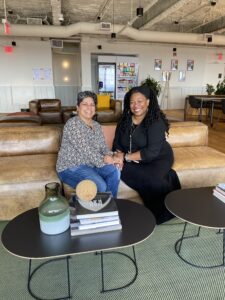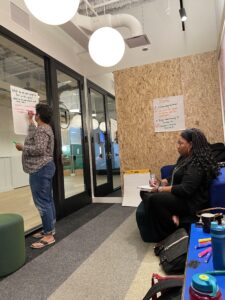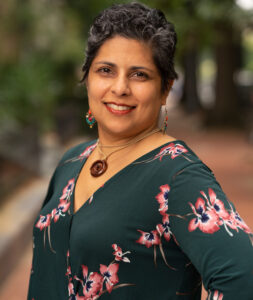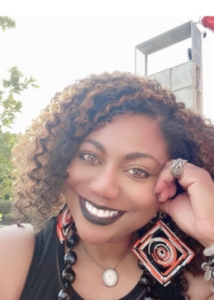Collective Reimagining and the Complex Work of Leading Systems
By Monica Biswas and Cecilia Belser-Patton | Edited by Rosie E. Aquila

From April 2021 to February 2022, a team of facilitators from the organizations ProInspire, Community Wealth Partners, JUST Systems, and Lassiter & Associates co-designed and led the Spark Heartland program. Funded by the Kauffman Foundation, this program brought together teams from 22 entrepreneurship-serving organizations (ESOs) for learning sessions around issues of identity, power, and racial equity. A primary goal from the Kauffman Foundation was to develop and deepen an ecosystem that would support Black, Indigenous, and People of Color (BIPOC) entrepreneurship in the Missouri, Kansas, Iowa, and Nebraska Heartland region. Our facilitation team hosted training sessions in July and October 2021, and February 2022, as well as offered coaching and peer circles for deeper skill and trust building, and exploration of identity.
In the dialogue below, Monica Biswas, a ProInspire Director and Spark project co-facilitator, talks with Cecilia Ananya Belser-Patton, JustSystems Founder and Spark project co-facilitator about practicing collective reimagining and the complex work of leading Systems. This conversation has been edited for length and clarity.
Monica: Cecilia, it is so good to see you! I’m so excited to have this conversation with you because I know you think about systems work a lot. When we were working on the Spark program, that was a significant part of the work that you held. So, I’m curious—when you think about systems work and ecosystem building, what even is that to you?
Cecilia: So when I think about ecosystem development, I think about the ways in which we’re creating space. Where everyone who is involved in whatever community we’re collectively building, growing, creating, and imagining, can have what they need to be sustainable. They can dream big about risking to get what they want. And, that there is mutual commitment and mutual collectivity around what that looks like. That’s going to look different for each organization or each person involved. It’s going to sometimes seem burdensome and heavy in spaces where people aren’t used to having to hold that as a paradigm shift. But, to me, it’s about ensuring that this cosmic space that we’re creating can support people to move authentically, dream big, have access to opportunities and resources and that everyone is committed to ensuring that we do that with one another.
Monica: Wow, and so it feels like even in how you’re describing it, equity is the essence of systems building. Because you’re talking about everyone being able to own it, share it, thrive in it. I love that equity is inherently part of your definition. And the idea that we can all show up authentically and own for ourselves what we bring to the system — our strengths, our identities, our power, whatever resources we have — I thought that was one of the powerful things about the Spark program. We went through all of that with the group because they built on each other. You may not want to share the power and resources that you have, unless you understand the identities I have and the privileges I have. They keep building on each other. In the beginning of the Spark program, we weren’t all there. We weren’t all feeling, “Yes, I want to be here as part of the system.” We got some people basically asking, “Why should I be a part of the system?”
Cecilia: “Who said I even wanted to be a part of this system?”
Monica: Right. Exactly.
Systems work takes a lot of emotional agility because trusting the messiness is an uncomfortable place to be.
-Monica Biswas
Cecilia: I think that reaction is a residual trauma. Recognizing that if these spaces were easy to create, people would have created them a long time ago. Or, rather, if they were easy to sustain. It can be easy to create and start building. But what I find challenging is the sustainability of ecosystems. What is challenging is ensuring that there have been relationships that are so fully developed that when the hurt happens—because there is going to be hurt—we don’t all fall back to our prior behavior. Without those relationships and trust, we’ll default to our defensiveness. We’ll default back to our power-hoarding. We’ll default back to our gatekeeping in ways that are hurtful. So what I find is that sometimes people who haven’t necessarily had access to opportunities and resources will enter into ecosystems from a place of, “Do I really want this? Is this really worth it? Because people are not going to do it anyways.” So there has to be this mutual and very deep-centered accountability in the ways in which people build together.
Monica: That resonates. What you’re highlighting is that the systems-level work needs the foundation of individuals who are aware of their identities and can show up with them and be humbly corrected when needed. And then also that they are going to value their relationships with people who might have different perspectives, different histories. And, you know, in the Spark program, we were working with organizations. So then there’s another layer of complexity. Certain organizations may not previously have been aware of the role they played in the ecosystem of, for example, hoarding those resources, right? The barriers to just doing this work are so messy. It’s so complex and layered. You said the hard part of ecosystems is sustaining, but I actually found it also hard to create! I felt that challenge because it was based on all of these other layers, which had to be developed.
Cecilia: That’s true–another way of putting it is that it’s not easy, but that we as facilitators can hold that creation space. But it’s then being willing to, and really having to, let that go. And expect for people that are new on this journey or new in this way of thinking—this paradigm shift—to then hold themselves accountable in sustaining it. I want to jump back to something you said earlier. You said, “These are organizations. We’re working with organizations.” Not only is it messy because we’re working with organizations, but it’s also messy because the people who are in the organizations may be at totally different places. And so systems work also is about understanding how to leverage that: how to expect the mess and the murkiness and the nebulous quality of all of that and trust that we’re going to be better for it on the other side.
Monica: Systems work takes a lot of emotional agility because trusting the messiness is an uncomfortable place to be. It may go against what we have been rewarded for in previous workplaces or projects or initiatives. For instance, the certainty of knowing, that if I can hit my ROI targets, I’m successful. You can’t measure systems work or collective reimagining that same way. When you think about impact measurement and systems work, the reality is that we may not achieve the thing we thought we were going to achieve. But we might achieve something else that was better because it actually represented the needs of the collective.
Cecilia: Right, yes. I also recognize that when you’ve never had to think about racial equity before, it can be overwhelming for your eyes to be opened to it and to truly make the commitment to think about it in all of your decision-making going forward. It’s clear to me that there’s something about this current system—this system of supremacy or dominant culture—that has been created to be the bar. So there’s always a bar stool where people can pony right back up to it and keep operating as they have been when things get messy. So building the muscle to really be able to exercise this work becomes a huge part of systems building and collective reimagining. Because, if not, folks will atrophy. We see that all the time.
Monica: Yes – and to that point – we get this question all the time: “How do ‘I’, as an individual, start doing systems work? How do I ‘do’ collective reimagining?” What would you offer as advice to someone who’s interested in doing systems-level work, collective reimagining work? Where do they start?

Cecilia: With themselves. And I know people hate that response because we want check-off boxes, especially for us who are doers because it makes us feel like we’ve done something. But really the work has to start from within – because then we will make different decisions, we will be able to advocate and lead from spaces of honesty and transparency and openness. It really does start with your internal process. I think what people tend to want to do is, “Oh, I’ve gone through a training so I’m fine and we’re going to be able to do this and check off this box.” And “We’ve been through this training and so now we’re ready to hire this person of color. We’re able to hire this person who is different from we are.” But then the organizational culture cannot hold that difference because the internal portion of the culture hasn’t been worked on. And so I think it’s a real assessment, awareness, and acknowledgement of where folks are and then moving to action. A lot of people want to move into action first and do all of that other stuff later. In my opinion, that doesn’t work.
Monica: Absolutely, I agree with that. Another thing that I think about in particular for people who have dominant identities, is to look and listen to what has been done before. Once you’ve done the internal work and you’re maybe ready to start to dive into some collective work, we’re not starting from scratch. There have been so many movements, so many people – to really look at what’s out there and listen and observe and not to, as you were saying, not to try and jump to action. Research what groups are out there that have already mobilized and organized. Bear witness to that and then figure out if that is somewhere where you have gifts to bring. And asking yourself that question before assuming it is true. That process can take awhile. I’ll speak from my personal experience — in my community, it has taken me a while and required me going to different group meetings. I had to find the one that felt right ultimately. The one that felt like a good fit. And it’s not that the groups that I visited earlier weren’t valuable, but they just weren’t the right spot for me to contribute and add to in the end.
Cecilia: Monica, I have a question for you – What gives you a lot of energy around systems work and collective reimagining and where do you hope this work takes you?
Monica: What gives me hope and where I draw energy from, especially when it gets hard, are the people. So investing time early on in building those relationships and a sense of understanding who we are as human beings before we even ever talk about what we’re trying to do together is really important to me. It’s a source of strength and energy, especially when it gets hard. Which is a lot! It’s not easy work.
Cecilia: I think that what activates me to remain hopeful in this work— which means to remain committed—is believing that we actually can have a collective reimagining and that my life and the life of so many people who look like me depends upon it. In many ways, I haven’t given myself permission to say it’s okay for me to be okay, while others are not. What I always hope to get out of this work is not only a bigger and broader community, but a deeper community where we deeply invest in one and other. And we really realize what all of the greats have said. Dr. King says injustice anywhere is a threat to justice everywhere. Lilla Watson, the Australian Aboriginal leader, says if you’re not clear about the fact that your freedom is tied to me then get out of here. I don’t need your saviorism; I don’t need your help. But recognizing that we really do, I believe, have the power. That everything we envision, it can be.
Monica: What do you think gets in the way of this work?
Cecilia: It’s not a linear process. You need to be cognizant of the fact that we’re going to be moving forward and moving back. It’s going to be that kind of waffling all the time and not getting caught up in feeling like we haven’t done the things that we need to do when we’ve fallen back. That’s when the courage comes in. Having the courage and the trust to know that we’re doing a meaningful and impactful thing. But with that comes barriers. With that comes challenges. And so, therefore, we’ll go backwards. But we’ll also have moments to go forward.
Monica: I love that non-linear piece. I think what gets in the way is our expectation of success or getting attached to one version of that. And systems work is inherently impossible to predict, or at least, I haven’t found a way to predict it! It reminds me of an essay by Mariame Kaba. A lot of times when people hear about abolition, they jump to the end. “Well, what would that look like to not have prisons? How would we do that? And what she says in response to that is, I don’t know. I don’t know what that would look like. But we’re in the process of becoming. We need to become and be in collective reimagination and be in the system so that we can get to whatever the new is. But I don’t have an answer to that yet because I’m still in this normal. That really resonated with me. Systems building is dependent on those who are involved. In making sure that we’re all okay, we can’t know what that’s going to look like because it’s this reaction that’s going to happen when everyone comes together. I’ve heard you say, Cecilia, “If you want to go fast, go alone. If we want to go far, we gotta go together.”
Cecilia: We’ve also talked about the fact that success doesn’t always look like bigger, better, more. It is not always quantity over quality. The sooner we can divorce ourselves from that expectation, I think the more that we will be committed to moving forward in systems work. It makes me think of my artist friends and our work and creative process. When I talk about Afrofuturism, people are like, “Well what is that?” And I say back, “You all, we’ve seen afro futurists.” Harriet Tubman had to be an Afrofuturist. She didn’t know where she was going. We don’t know what it looks like to decenter all of the things that we’ve centered. But I hope we know that it’s better than what we’ve been doing thus far. There is this way of having this futurist thinking of systems and how we can collectively imagine what is best for us so that we’re creating spaces of not only diversity – we’ve been doing diversity for a long time – but of inclusion, and equity, and belonging. How can that be bad? If we’re building and imagining a belonging space where no matter what, you’re good. That’s it. I don’t know what it’s going to look like, but I know it will feel good.
Monica: Well thank you so much – it’s been such a pleasure, as always Cecilia, to talk with you but also to spend time reflecting on parts of this program. It was fun to do that with you in partnership!
Cecilia: Yes, I am looking forward to all the things we will do together.
Meet the Authors

Monica Biswas, Director

Cecilia Belser-Patton, Principal & Cultural Curator, JUST Systems

Rosie E. Aquila, Manager
